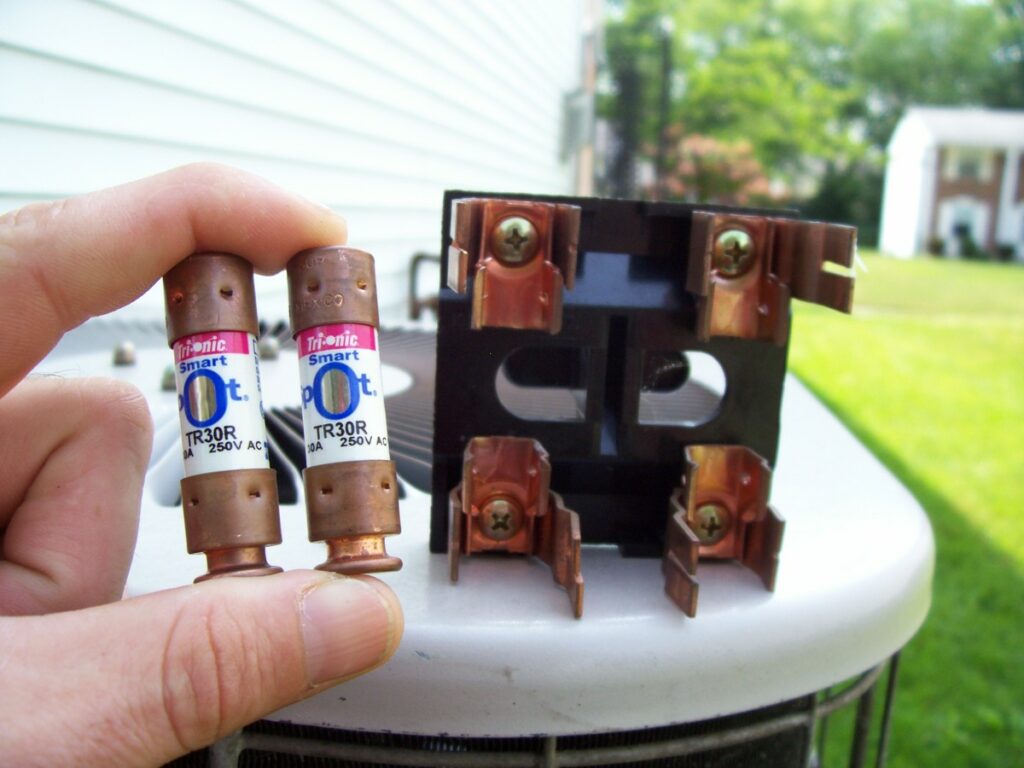
When the summer heat becomes unbearable, you need your air conditioner the most. Unfortunately, most of air conditioning issues crop up during this time. The problem could be due to several reasons. Some, it is due to the air condtioner fuses which are more vulnerable to blowing out when temperatures are rising up.
The AC fuses are one of the most crucial parts of your air conditioning system. Let’s go over to learn how to identify whether an air conditioner’s fuse has blown. You can better prepare for your cooling service needs and avoid expensive repairs in the future if you can figure out why your AC system is failing.
What Kind of Fuse Does an Air Conditioner Use?
If your air conditioner is rated for 35 amps, use a fuse rated for 35 amps or less, but not too small. The device should also have a minimum fuse size rating. However, the disconnect must be correctly rated as well, otherwise your concern over fuse size will be a moot case.
How to Check for a Blown AC Fuse:
Start by listening for any strange air conditioner noises—anything out of the norm that could make you worry. Be on the watch for buzzing, humming, or clicking noises in particular.
The buzzing sound comes from your furnace which is at work to cause your air conditioner to turn on. Reach out to the professionals for central air conditioning repair in Manhattan.
Aside from sound, you might explore further to see whether your air conditioner fuse has blown. Don’t take chances. If you don’t have a basic understanding of air conditioner circuits, you are better off calling in an HVAC professional to do the job for you.
Use a Voltmeter to Check for Blown Fuses:
Following are the steps:
- First, locate the air conditioning fuse. Usually, it is located in the disconnection box which is right next to the outdoor unit. Check it out.
- Open it up to expose the cables inside. Be cautious – you are working in high-voltage territory.
- Activate your voltmeter and ensure the reading zero.
- Check out the lines that supply electrical power to the air conditioner. The value must be around 220 to 240 volts, indicating that the power source is working fine.
- Next, test the outgoing lines. If the reading is zero, then the AC is blown.
Why Does an AC System Keep Blowing Fuses?
Aside from excessive heat, air conditioners can blow fuses for a number of different reasons, including the following:
The following are some of the variables that might cause your air conditioners to blow fuses at work.
Circuit Malfunction:
The common major sources of a large problem are your circuit, fuse box, or power supply. Your breakers might trip or fuses blow frequently due to excessive amperage in the power line for the systems to handle. Call in the experts to help you with central air conditioning repair in Queens.
Faulty Capacitor:
The capacitor within the condenser serves to regulate electrical current. If the equipment conks off, the fuse is likely to explode.
Dirty Filters:
A dirty filter causes your device to work harder than it should, causing it to overheat and break the fuse. To avoid overheating your system, make sure your air filters remain clean throughout the summer. Call in technicians for AC repair NYC.
Loose Electrical:
Loose electrical is another reason for faulty filter. The system breaks down when temperature goes high up and the components come loose.

Simone Arnica is the certified and more than 35 years experienced HVAC expert from Arnica Heating and Air Conditioning Inc. suggesting maintenance tips for the HVAC system to protect it from early damage, unwanted maintenance cost and also to save on energy cost. Follow the blog to learn how it can be done easily.




Leave a Reply
You must be logged in to post a comment.